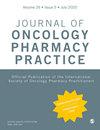对因血液病有先天性血肿风险的患者肌肉注射替沙吉单抗-西格维单抗(Evusheld®)的安全性
IF 1
4区 医学
Q4 ONCOLOGY
引用次数: 0
摘要
导言传统上,由于存在先天性血肿的风险,血液病患者避免进行肌肉注射(IM)。Tixagevimab-cilgavimab(Evusheld®)是一种新型单克隆抗体组合,用于严重急性呼吸系统综合征冠状病毒 2(SARS-CoV-2)的暴露前预防,适用于严重感染风险最高的人群。它通过两次独立的 IM 注射(每次 1.5 毫升)给药。方法对一家大型都市医院血液科接受替沙吉单抗-西格维单抗治疗的患者进行了回顾性和前瞻性联合研究。所有患者均接受了 Tixagevimab-cilgavimab IM 给药,并根据当地方案提供了血小板和因子替代。患者在注射后的七天内每天填写疼痛数字评分,评分≥4/10时应进行超声波检查,以确定是否存在先天性臀部血肿。结果该研究共招募了131名患者;66名患者患有血小板减少症,其中10名患者的血小板计数为30×109/L。14名患者(10.7%)在使用替沙吉单抗-西格维单抗前接受了单次血小板输注,2名患者接受了新鲜冰冻血浆。结论 血液病患者对替卡西单抗-西格维单抗肌肉注射的耐受性良好,且未出现先天性血肿。本文章由计算机程序翻译,如有差异,请以英文原文为准。
Safety of intramuscular tixagevimab-cilgavimab (Evusheld®) administration in patients at risk of iatrogenic haematoma due to haematological disorders
IntroductionTraditionally, intramuscular (IM) injections have been avoided in patients with haematological diseases due to the risk of iatrogenic haematoma. Tixagevimab-cilgavimab (Evusheld® ) is a novel monoclonal antibody combination used as preexposure prophylaxis against severe acute respiratory syndrome coronavirus 2 (SARS-CoV-2), for those at highest risk of severe infections. It is delivered as two separate IM injections (1.5 mL each). Patients with haematological disease are at higher risk for severe SARS-CoV-2 infections, which may be partially abrogated by the prophylactic inoculation of tixagevimab-cilgavimab.MethodsA combined retrospective and prospective study of patients under the haematology service at a large metropolitan hospital receiving tixagevimab-cilgavimab was conducted. Tixagevimab-cilgavimab was administered IM to all patients, with platelet and factor replacement provided according to local protocols. Patients completed a numerical pain score daily for seven days following the injection, with scores ≥4/10 prompting an ultrasound to identify iatrogenic gluteal haematomas.ResultsThe study recruited 131 patients; 66 patients were thrombocytopenic, including 10 patients with a platelet count <30 × 109 /L. Fourteen patients (10.7%) received a single platelet transfusion prior to tixagevimab-cilgavimab administration, while two patients received fresh frozen plasma. No gluteal haematomas were identified, and only two patients reported an initial pain score of ≥4/10.ConclusionsThe intramuscular administration of tixagevimab-cilgavimab in patients with haematological diseases was well tolerated and was not associated with iatrogenic haematoma.
求助全文
通过发布文献求助,成功后即可免费获取论文全文。
去求助
来源期刊

Journal of Oncology Pharmacy Practice
Medicine-Oncology
CiteScore
2.70
自引率
7.70%
发文量
276
期刊介绍:
Journal of Oncology Pharmacy Practice is a peer-reviewed scholarly journal dedicated to educating health professionals about providing pharmaceutical care to patients with cancer. It is the official publication of the International Society for Oncology Pharmacy Practitioners (ISOPP). Publishing pertinent case reports and consensus guidelines...
 求助内容:
求助内容: 应助结果提醒方式:
应助结果提醒方式:


